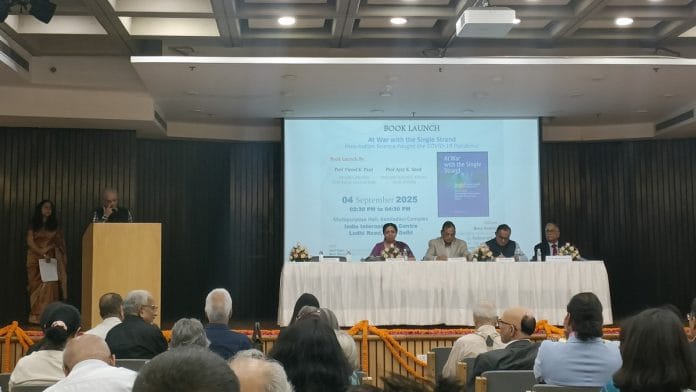New Delhi: The who’s who of India’s pandemic battleforce assembled to launch a book on how the country prevailed over Covid-19. From diagnostics to vaccines, it was a retrospective of success. No one said a word about the deaths. Instead, the mood was summed up by a slogan repeated by multiple speakers: “Corona haarega, desh jeetega”—Corona will lose, the country will win.
Published by Springer, the book, At War with the Single Strand: How Indian Science Fought the COVID-19 Pandemic, is a collection of essays and stories by scientists, policymakers, administrators, and industry leaders who steered India’s response to the virus in 2020. It was launched on 4 September at an event organised by the INCLEN Trust International.
“It is an endeavour to capture the hard work of our country to achieve a scientific triumph against the virus,” said Renu Swarup, former secretary of the Department of Biotechnology and one of the book’s editors, at the launch. “One single RNA strand brought the whole world to its knees, but we persevered.”
At the India International Centre’s Kamaladevi Hall, senior officials from the science and health ministries, Biotechnology Industry Research Assistance Council (BIRAC), and industry representatives from companies such as Serum filled the audience. From those who overhauled India’s diagnostic labs and developed RT-PCR kits, to the teams that designed vaccines and built the Cowin portal to track vaccinations, both the book and the event were an ode to their work.
Launched by AK Sood, the principal scientific advisor to the Government of India, and Vinod Paul, member (Health) of NITI Aayog, the book took two years to complete. With 20 chapters and 77 authors, it is a mammoth attempt to document how different branches of government worked on war footing to tackle the pandemic, which killed more than 5 million people worldwide. But the speeches by the panellists never took a morose turn.
“The Covid pandemic was not a tragedy but an opportunity for Indian science,” said Dr NK Arora, former AIIMS professor and now director of INCLEN Trust, one of the book’s editors.
Also Read: Arthashastra to Ganita Kaumudi—rare manuscripts on display at Gyan Bharatam conference
A silent toll
Swarup, Arora, and Sood took turns speaking about the book and the times it captures, weaving in personal anecdotes.
Swarup recalled how India had no indigenous capacity to diagnose Covid-19 until Andhra MedTech Zone (AMTZ) and MyLab stepped in to develop RT-PCR kits. Vaccines followed a similar trajectory, according to Arora, who noted that by the end of the pandemic, India had eight vaccines available—more than any other country.
The book itself is divided into sections such as The Diagnostic Success Story and Make in India Vaccines: A True Story of Atmanirbhar Bharat, along with chapters on digital interventions, start-ups, industry-academia partnerships, and understanding the virus.
“None of us had experience with a pandemic—we had only read about the Spanish flu. Now we know that pandemics are not just health events but social, scientific, and strategic challenges too,” said Sood. “We don’t know what lies in the future but we know we have the capability and intellect to fight back.”
Though the afternoon’s discussions touched on many aspects of India’s Covid response, the subject of deaths—including causes such as lack of essentials like oxygen or issues with the count—never came up. While the World Health Organization pegs India’s toll at 5.3 lakh, the central government clarified in 2025 that there were over 15 lakh excess deaths recorded for 2020-21.
Toward the end of the event, the panellists invited on stage the 20 or so authors who were present in the audience. Each briefly took the mic to share what the book and contributing to it meant to them.
“Covid-19 was a biological virus, and we Indians proved we could handle it efficiently,” said Jitendra Sharma, founder–CEO of AMTZ. To laughter, he added: “Now, we might be getting a tariff virus, an economic virus next. I’m sure we’ll convert that challenge to an opportunity too.”
(Edited by Asavari Singh)






